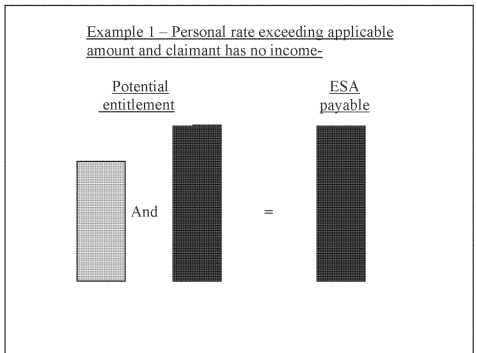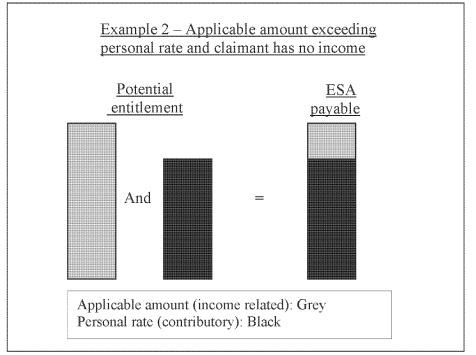Entitlement
Section 1: Employment and support allowance
49.This section sets out the entitlement conditions of the employment and support allowance. This introduces a new benefit structure with both an income-related allowance and a contributory allowance within the same benefit, similar to a jobseeker’s allowance (except that there will be no time limits for either strand). In addition to satisfying the basic conditions of entitlement, a person will need to satisfy either the National Insurance contribution-based tests or the income-related tests in order to be entitled to an employment and support allowance. The contribution-based tests will be the same, in substance, as apply now for incapacity benefit. The income-related tests will be the same, in substance, as apply now for the purposes of income support.
50.There will be an alternative to the usual National Insurance contribution tests for those who were under 20 years old when their period of limited capability for work began (or under 25 years old in certain circumstances). If they had had limited capability for work for the preceding 196 days and satisfy other conditions, they would not have to satisfy the contribution conditions to get entitlement to the contributory allowance. This is to ensure that young people, who may not have had the opportunity to build up a sufficient contribution record, will not be excluded from the non means-tested allowance. Again, this is similar to the provisions for young people currently in incapacity benefit, as set out in the Social Security Contributions and Benefits Act 1992, section 30A.
51.A person also has to satisfy the basic conditions (see subsection (3)). One of those basic conditions is that the person has limited capability for work and the meaning of this phrase is set out at subsection (4). Further provision about the test to assess whether a person’s capability for work is limited by his physical or mental condition and the limitation is such that it is not reasonable to require him to work is made in section 8.
Section 2: Amount of contributory allowance and; Section 3: Deductions from contributory allowance: supplementary
52.Sections 2 and 3 set out how the amount of contributory employment and support allowance will be calculated. Subsection (1)(a) of section 2 provides that the calculation is begun by taking such amount as may be prescribed. It is expected that this amount will be age-related in the assessment phase and based on the levels of contribution-based jobseeker’s allowance, but that it will be universal for all ages once the assessment phase is complete.
53.Once the assessment phase has been completed (the length of which will be determined by regulations, with a proposed length of 13 weeks) a ‘work-related activity component’ or a ‘support component’ will also be added on top of the prescribed amount. Regulations may disapply the requirement to wait until the end of the assessment phase to become entitled a work-related activity component or support component. A person will be entitled to a support component if he or she has limited capability for work-related activity (see section 9). A person will be entitled to a work-related activity component if he or she does not have limited capability for work-related activity.
54.Sums may be deducted from the amount of contributory allowance in respect of certain payments. It is intended that regulations would prescribe the same deductions as those which are taken into account for the purposes of incapacity benefit currently. If these payments were over a certain amount, it is intended that the amount of employment and support allowance payable could be reduced by a certain proportion. For example currently an amount equal to 50 per cent of certain pension payments over £85 per week is deducted from the amount of incapacity benefit payable. In addition, deductions are also made in respect of local councillors’ allowances. This is set out in the Social Security Contributions and Benefits Act 1992, sections 30DD and 30E.
Section 4: Amount of income-related allowance
55.This section provides for the calculation of the amount of an income-related employment and support allowance. Entitlement is based on rules similar to those which apply for income support, which the income-related allowance will replace for people with a health condition or a disability.
56.This section provides that the amount of the income-related allowance is the “applicable amount”, if the claimant has no income, or the difference between the claimant’s income and applicable amount, if the claimant has income. An applicable amount is the weekly amount a person would receive if they had no income at all. For example a single person claiming income support aged over 25 years old who is not entitled to any of the available premiums would be entitled to income support of £59.15 per week (April 2007 rate) but this would be reduced to £49.15 if they had an income of £10 per week. Applicable amounts can vary; for example, dependent on whether the claimant has a partner. Like the contributory allowance, there is a proposed assessment phase of 13 weeks. After the assessment phase, the amount of the work-related activity component or, if the claimant satisfies the relevant test, the support component will be included in the applicable amount.
57.Subsection (2)(a) provides the power to prescribe amounts to be part of the applicable amount. This includes, for example, where the claimant is an owner-occupier with housing costs. It is intended that additional amounts will be prescribed in respect of those costs, such as mortgage interest, ground rent or service charges. These are similar to the arrangements which currently apply to income support. The power would also allow for other additions to be made in future without the need for further primary legislation.
58.In addition to housing costs the power could also be used to include certain premiums. It is intended to pay an equivalent to the enhanced disability premium, severe disability premium and the carer premium using the same rules as for income support. In April 2007 the rate of the enhanced disability premium was £12.30 for a single person and £17.75 for a couple; the severe disability premium was £48.45 for a single person and £96.90 for a couple. The carer premium was worth £27.15 per week.
59.It is not intended to use the powers under this section to make any provision for children, as provision will be made by child tax credits, which are administered by Her Majesty’s Revenue and Customs.
60.Subsection (3) provides the power to prescribe nil as an applicable amount. For example, paragraphs 7 and 8 of Schedule 7 to the Income Support (General) Regulations 1987 (S.I. 1987/1967) currently prescribe a nil amount for the purposes of income support in relation to certain prisoners and to members of religious orders who are fully maintained by their order. The policy intention is that such people will be treated in the same way for the purposes of income-related employment and support allowance.
61.For both the contributory and income-related allowance, sections 2 and 4 provide for entitlement to the work-related activity and support components to be backdated if, where the regulations provide, the assessment phase is extended (section 24(2)). For example, it is intended that this should be done where it has not been possible to complete the medical assessment process within the proposed standard 13 week period of the assessment phase. In such cases if the claimant is subsequently determined to have limited capability for work, then entitlement to the relevant work-related activity or support component will be backdated so that the claimant will receive the relevant work-related activity component or support component as if the assessment phase had ended at the end of week 13 of entitlement to an employment and support allowance.
62.Regulations made under sections 2(4) and 4(6) are expected to provide that, in certain circumstances, where a person was previously entitled to employment and support allowance then the condition of entitlement to the work-related activity component and support component that the assessment phase must have ended shall be disapplied. This will mean that a claimant may be entitled to the work-related activity or support component immediately they become entitled to an employment and support allowance.
Section 5: Advance award of income-related allowance
63.This section provides for the situation where a person, due to having income exceeding the applicable amount, is not entitled to an income-related employment and support allowance in the assessment phase, but may become entitled to an income-related allowance when, at the end of the assessment phase, they become entitled to either the work-related activity component or the support component. The section modifies section 5(1) of the Social Security Administration Act 1992 so as to enable regulations to be made to deal with this situation. Such a case may arise because a person has an income above the applicable amount during the assessment phase (which would mean that the claim would normally be rejected) but, when the applicable amount includes the work-related activity or support component, their income is less than the applicable amount. Regulations will be able to provide that such a person can make a claim and that an award of employment and support allowance could arise at a future date, provided that certain conditions were satisfied.
Section 6: Amount payable where claimants entitled to both forms of allowance
64.This section provides for cases in which a person is entitled to both a contributory allowance and an income-related allowance. In this section the amount calculated in accordance with section 2(1) (amount of contributory allowance) is called the “personal rate”. If the person has no income and their personal rate is higher than their applicable amount (for the purposes of income-related allowance), they get the personal rate. If the claimant has no income and their applicable amount exceeds their personal rate, they will get their personal rate, plus an additional amount of income-related allowance equal to the excess. If the person has an income, the amount payable will be the greater of his personal allowance and the amount by which his applicable amount exceeds his income.
65.Below there are some illustrations to show how this would work in the case of a person with no income. The applicable amount (which is relevant to the income-related allowance) is illustrated in grey. The personal rate (which is relevant to the contributory allowance) is illustrated in black.
Applicable amount (income related): Grey
Personal rate (contributory): Black
Section 7: Exclusion of payments below prescribed minimum
66.This section contains a power equivalent to the power in section 134(4) of the Social Security Contributions and Benefits Act 1992. The intention is that employment and support allowance will not be paid if entitlement is below 10 pence, unless payment is combined with payment of another benefit.


